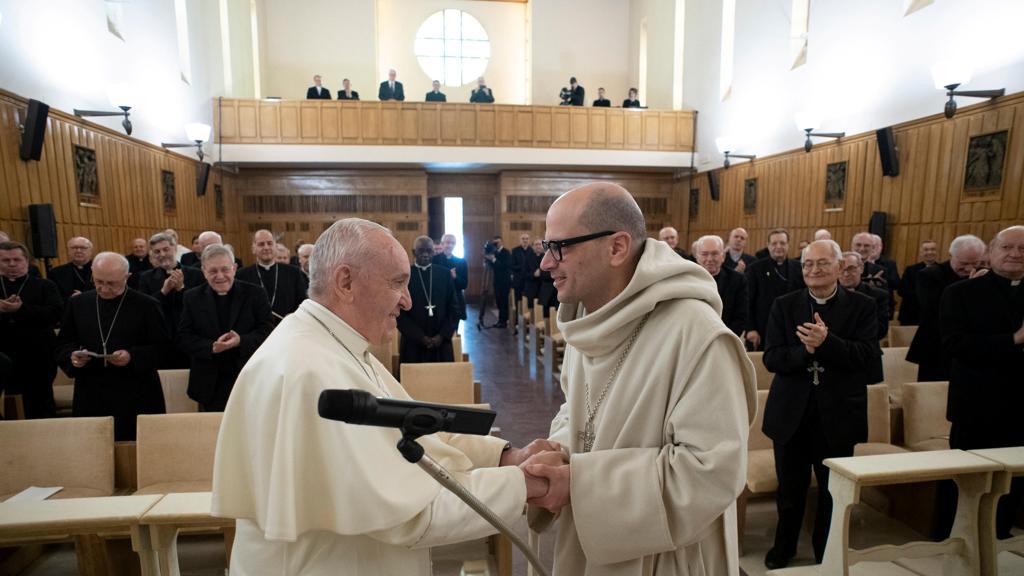We are all sinners but we go ahead serving the Lord
“I thank you very much. Pray for us, we who are all sinners, all of us, but we want to go ahead in this way, serving the Lord.”
Mar 22, 2019

By Salvatore Cernuzio
“I thank you very much. Pray for us, we who are all sinners, all of us, but we want to go ahead in this way, serving the Lord.” The last word is always up to the Pope at the end of the Lenten Spiritual Exercises with the Roman Curia, which began March 10 in the Casa Divin Maestro in Ariccia and ended March 15.
As usual, after the last meditation of the preacher, the abbot of San Miniato al Monte di Firenze, Bernardo Francesco Maria Gianni, Pope Bergoglio took the floor and in front of bishops and cardinals thanked “brother Bernardo, for your help in these days. I have been struck by your work to allow us to enter, as did the Word, into the human; and to understand that God always makes Himself present in the human.”
Now the Pope’s and his collaborators’ work is “to move forward,” Francis stressed. “I thank you very much for this work.
I thank you for speaking about memory: this ‘deuteronomic’ dimension that we forget; for speaking about hope, work, patience, how to show us the way to have that ‘memory of the future’ that we always take forward. Thank you!”
Pope Francis confessed that he has thought on more than one occasion during these days of reflection and prayer, at
Gaudium et Spes, one of the main constitutions of the Second Vatican Council on the Church in the contemporary world. Perhaps the document “that has encountered most resistance, even today”, he observed, “And in that moment I saw you in that way: with the courage of the Council Fathers when they signed that document.”
However, the Pontiff did not spare an ironic note on the preaching of the abbot, confessing that he remained “disoriented” by reading the titles of the meditations centred on The City of Ardent Desires: For Paschal Looks and Gestures in the Life of the world, inspired by a poem by Mario Luzi.
“And it made me laugh when you said that some people, reading the titles of the meditations, perhaps did not understand what the Curia did,” Francis said. “Perhaps they had hired a tourist guide to show them Florence and its poets… And I too at the first meditation was a little disorientated, and then I understood the message.”
Among the general laughter, the Pope reiterated his gratitude and that of the representatives of the Curia to the Benedictine. “Thank you very much, and greet the monks on my behalf and on our behalf. Thank you!”
In his last meditation after the Pope’s Mass, Don Gianni once again took inspiration from Luzi’s verses, this time it was the poem The city on the mountain, to comment on the relevance of the Church and the world. In particular, the monk recalled the last terrorist attack that took place Mar 15 in two mosques in New Zealand to emphasise that “many of our cities offer and generate feelings of uprooting that favour - amid the many problems of the city, of the contemporary megalopolis, anti-social behaviour and violence, I would add – stirred by fear. What happened in the two places of worship in Christchurch is proof of this.”
“However,” the preacher added quoting the words of Pope Francis himself, “I would like to reiterate that love is stronger. Many people in these conditions are capable, in spite of everything, of weaving bonds of belonging and coexistence that transform crowding into a community experience, in which the walls of the self are broken and the barriers of selfishness are overcome.”
“The Church,” he added, “ cannot dispense herself from being ferment, an authentic and credible witness to this process of love, which happens in cities if we know how to look at them with that contemplative eye that Evangelii Gaudium itself, that Riccardo di San Vittore, that Giorgio La Pira, that Mario Luzi, are teaching us these days.”
And precisely in the wake of their teachings, the religious pointed out that “the great task left to the holy people of God, to its pastors, and all those who feel the reliable, plausible, reasonable beauty of an end rich in meaning that Revelation today has uncovered to us, is in a certain sense to measure the distance between here and that future time promised by the Lord. There is only one measure.”
The mayor of Florence Giorgio La Pira already stated this “with great passion”: “The filter through which all historical collective human problems must be filtered, in every time, in every place, in every historical situation. Here it is, the living word of God, the measure, here it is, the Holy Scripture.”
The abbot therefore urged to “widen” and “stretch” the gaze towards the future, specifying however that “the expectation of a new land should not weaken but rather stimulate our commitment in the work related to the present land. Ours must be “steps of faith, hope, love, responsibility and communion, with hands – as we mentioned earlier – holding other hands and, in this mystical communion, be the sign, the foreshadowing, the outline of the great hope that the Lord reserves for all humanity, which we cannot and must not deny with the calculation of our individualisms.” This, Gianni said, is “the horizon of the Church” and “of the entire human family.”--La Stampa







Total Comments:0